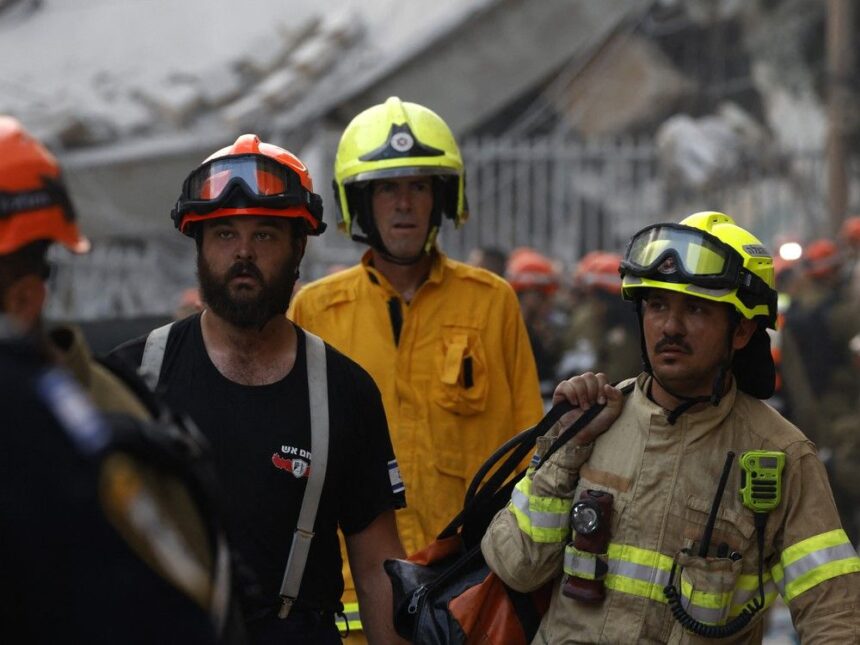I was on the last train heading south to Tel Aviv when the sirens began.
The distinctive wail cut through the evening commute as passengers exchanged glances—some panicked, others resigned to what has become a grim routine in Israel’s economic capital. Within seconds, our train ground to a halt, and conductors directed everyone to crouch below window level.
“Five minutes,” muttered a woman beside me in accented English, clutching her phone. “That’s how long we have before we know.“
What transpired in those five minutes—and the chaotic hours that followed—revealed an unexpected story of Canadian diplomatic staff who abandoned protocol to assist strangers when Iranian missiles struck central Tel Aviv on April 13th.
“We don’t typically discuss security operations, but in this case, the actions of our team went well beyond their duties,” said Kimberly Johnson, Communications Director at Global Affairs Canada, when reached for comment three days after the incident.
According to witnesses and officials, four Canadian Embassy staffers based in Tel Aviv were returning from a security briefing when the missile alert activated. Rather than proceeding to designated diplomatic shelters, the team diverted their vehicle toward a collapsed apartment building where local emergency services were overwhelmed.
“I saw them arrive in an SUV with diplomatic plates,” recalled Daniel Weizman, a Tel Aviv resident who was helping coordinate civilian rescue efforts. “They identified themselves quickly as Canadian staff, asked where help was needed most, and immediately began working alongside us to reach people trapped in the eastern stairwell.”
The missile barrage—Iran’s direct response to an earlier Israeli airstrike on its embassy compound in Damascus—marked an alarming escalation in the regional conflict that began with Hamas’ October 7th attack. Unlike Hamas rockets, which are typically intercepted by Israel’s Iron Dome defense system, several Iranian ballistic missiles penetrated air defenses, striking residential areas.
What made the Canadian intervention particularly notable was its unauthorized nature. Embassy security protocols typically prohibit staff from entering active danger zones, especially during military exchanges.
“This wasn’t officially sanctioned,” acknowledged a senior Canadian diplomatic source who requested anonymity due to the sensitivity of discussing security matters. “But our people made a human calculation in the moment that outweighed procedural concerns.”
The team, which included two security officers with emergency medical training, a consular official, and a political affairs officer, worked for nearly three hours alongside Israeli first responders. According to the Tel Aviv Fire Service, they helped extract seven residents from damaged structures, including an elderly couple and a family with young children.
Roi Cohen, deputy commander with Magen David Adom emergency services, told me the Canadians’ assistance proved crucial during the chaotic first hour after the strike. “Professional help was stretched thin across multiple impact sites. Having trained individuals who could safely navigate partially collapsed structures made a significant difference in at least two rescues.“
The Canadian Embassy in Tel Aviv has maintained a limited but essential presence since October, despite Global Affairs Canada’s evacuation advisory for the region. A skeleton crew primarily handles consular emergencies for the estimated 6,500 Canadians who remain in Israel according to government figures.
Prime Minister Justin Trudeau acknowledged the staff’s actions during a press conference in Ottawa on Monday, calling their response “representative of Canada’s commitment to humanitarian principles, even in the most difficult circumstances.”
The incident has raised questions about diplomatic security protocols during crises. While most embassies maintain strict non-intervention policies during military actions, the Canadian team’s decision highlights the complex realities facing diplomatic staff in conflict zones.
“There’s always tension between security protocols and humanitarian impulses,” explained Dr. Elena Sorokina, Professor of Diplomatic Studies at Carleton University. “What’s noteworthy here is that these weren’t military personnel or designated emergency responders—they were diplomatic staff making a split-second ethical choice that technically violated their security guidelines.”
For Israelis affected by the strike, the nationality of their helpers mattered less than their willingness to assist. “In that moment, they weren’t Canadians to us—they were just people helping other people,” said Weizman. “But afterward, when things calmed down, it meant something that they chose to stay when they could have easily returned to their secure compound.”
The Israeli Foreign Ministry issued a formal note of appreciation to Canadian officials, though details remain classified due to the ongoing security situation.
Canadian Embassy officials declined my requests for interviews with the staff members involved, citing security considerations. However, Foreign Affairs Minister Mélanie Joly issued a statement noting that while the staff’s actions “demonstrated the finest qualities of Canadian public service,” the embassy was reviewing security protocols to ensure staff safety remains paramount.
As tensions between Iran and Israel continue to escalate, with the potential for further exchanges, the incident underscores the unpredictable human dimensions of international conflicts—where diplomatic staff can suddenly find themselves making life-or-death decisions far beyond their job descriptions.
For the residents of the damaged Tel Aviv apartment complex, the distinction between official protocol and human compassion became irrelevant the moment the Canadians parked their diplomatic vehicle and asked how they could help.
“When missiles are falling,” Weizman told me as we surveyed the damaged building the following morning, “you remember who runs toward danger rather than away from it.“






